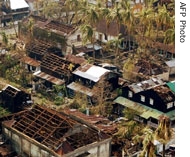-
(单词翻译:双击或拖选)
By Ron Corben
Bangkok
04 June 2008
United States naval1 ships with relief supplies for cyclone2 victims in Burma are leaving the area, because the Burmese government refused their help. As Ron Corben reports from Bangkok, international agencies trying to help more than two million storm survivors3 regret the loss of the navy's resources.
 |
| The USS Essex , center, and the Essex Amphibious Ready Group steam in formation, in the Andaman Sea, 23 May 2008 (photo released by U.S. Navy) |
The USS Essex and several support vessels4 are leaving the seas near Burma after spending three weeks trying to deliver aid to the survivors of Cyclone Nargis.
The French navy also has given up efforts to send in aid and is heading away from the Bay of Bengal.
Burma's government has rejected offers to use other country's military helicopters to carry relief supplies.
Instead, in the past week the World Food Program received two helicopters from Africa, but aid experts say that is not enough.
WFP spokesman Paul Risley says it is unfortunate that U.S. Navy helicopters will not be available to bring aid across the Irrawaddy Delta5.
"And this is truly unfortunate because these helicopters represented immediate6 heavy lift capacity in the area and would have been a standard operating procedure for the U.N. for relief agencies in responding," he said.
Military helicopters from several nations played a vital role in relief efforts in Indonesia after the 2004 tsunami7. They also helped in the aftermath of a cyclone that hit Bangladesh last year.
Burma's state media say the government rejected the U.S. military aircraft because it feared an invasion, despite U.S. assurances that wanted only to provide aid.
 |
| This aerial view shows a devastated8 town, with many roofs missing, in the Irrawaddy Delta region, Burma, 06 May 2008 |
The cyclone that hit a month ago left more than two million people in need of food, shelter and medical care. The storm killed 78,000 and left 56,000 missing.
International donors9 have condemned10 the Burmese government's roadblocks to relief efforts. U.S. officials say the delays may have cost "tens of thousands of lives."
The United Nations and ASEAN recent reached an agreement with Burma to allow international aid workers more access to the areas worst hit by the storm.
But U.N. officials said Wednesday relief efforts need to expand rapidly, since just one point three million people had gotten any sort of assistance.
The Irrawaddy Delta is Burma's main rice-growing region, but U.N. officials said Wednesday that 60 percent of the paddy fields were damaged in the storm. About 16 percent are too badly damaged for the next planting season, in July.
The WFP's Risley says international food aid to the hardest-hit areas could last a year.
"In a situation such as this it would be very typical for the World Food Program to continue providing food rations11 through general deliveries for families and farmers in the delta area, certainly through the next six months, certainly through the next harvest. It is likely that harvest will not be able to take place for an entire year," he said.
U.N. officials say few farmers have returned to their land because they have no food, shelter or farm tools. In addition, roads throughout the region remain unusable.
 收听单词发音
收听单词发音
1
naval

|
|
| adj.海军的,军舰的,船的 | |
参考例句: |
|
|
|
2
cyclone

|
|
| n.旋风,龙卷风 | |
参考例句: |
|
|
|
3
survivors

|
|
| 幸存者,残存者,生还者( survivor的名词复数 ) | |
参考例句: |
|
|
|
4
vessels

|
|
| n.血管( vessel的名词复数 );船;容器;(具有特殊品质或接受特殊品质的)人 | |
参考例句: |
|
|
|
5
delta

|
|
| n.(流的)角洲 | |
参考例句: |
|
|
|
6
immediate

|
|
| adj.立即的;直接的,最接近的;紧靠的 | |
参考例句: |
|
|
|
7
tsunami

|
|
| n.海啸 | |
参考例句: |
|
|
|
8
devastated

|
|
| v.彻底破坏( devastate的过去式和过去分词);摧毁;毁灭;在感情上(精神上、财务上等)压垮adj.毁坏的;极为震惊的 | |
参考例句: |
|
|
|
9
donors

|
|
| n.捐赠者( donor的名词复数 );献血者;捐血者;器官捐献者 | |
参考例句: |
|
|
|
10
condemned

|
|
| adj. 被责难的, 被宣告有罪的 动词condemn的过去式和过去分词 | |
参考例句: |
|
|
|
11
rations

|
|
| 定量( ration的名词复数 ); 配给量; 正常量; 合理的量 | |
参考例句: |
|
|
|















